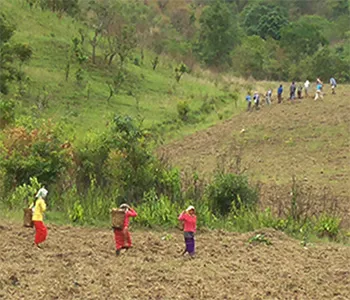The Manipuri Entrepreneur who has changed the tea drinking habit of the region and created 2000+ jobs
This story is as refreshing as the brew they make. Ragesh Keisham has set out to give Manipur its proper place under the sun, and make true the sobriquet attached to it of being the ‘land that laid the golden egg’.
Ragesh is the Founder of SuiGeneris Inc, a venture that has innovated and discovered a new variant of tea made from lemongrass aka Cymbopogon Citratus, being sold under the brand name of CC Tea.
Ragesh says they have got interests for the product from local as well as international market and by next year they will plant about 600 acres with CC Tea. CC Tea has captured about 25% of the local Manipuri market and by next year 2015, the plan is to double the share. What appears like a great future has had its own share of challenges and turmoils, but today the SuiGeneris story is one of hope and inspiration. Read on.
Beginning of journey
SuiGeneris means unique or “one of its kind” in Latin, and Ragesh says he chose the name because that is what he has set out to achieve with his venture. SuiGeneris and CC Tea were launched in August 2011, but the legwork started way back in 2007. However, this is not the first venture that Ragesh set out to do. Ragesh says he had nurtured the dream of being a businessman right from childhood. The inspiration is perhaps his grandfather, who, Ragesh says, was a flamboyant businessman of his time, but also went bankrupt in his lifetime. His parents then stuck to the norm that is characteristic of Manipur, which is taking up a government job. “Manipuri people are always dependant on government jobs, and today there are 7.5 unemployed youth registered in government registers,” he points out.

Ragesh dabbled in some freelancing and consulting jobs at the beginning of his career. The first proper venture he set out to do was a BPO business, which was a contract he took from his friend in the UK for data digitization. However, the venture folded up soon because of unfavourable social conditions in Manipur. The problem was reliance on electricity, which Ragesh says is a scarcity in Manipur. Regular power cuts plague the state and sometimes the power supply is only for 4 hours in a day. Given such constraints the BPO business soon folded up.“Although I was born in Manipur, I have not lived there, my education happened in Pune. So I didn’t know much about the place. So I thought people are doing BPO business, let me also do it,” he explains. However, once he realized the constraints in doing a BPO business, Ragesh set out to understand which could be his next outing. About zeroing in on farming, Ragesh says the rationale was that to do any business in Manipur, it had to be something that could use the local resources available and not be reliant on something external.
Founding SuiGeneris
Farming, a dominant occupation in Manipur, caught his attention and that sow the seeds of SuiGeneris Inc. His tryst with agriculture started in 2005, when Ragesh started researching and brainstorming with many experts in the agricultural field about that one product which could be turned into a bigger venture.
During one such discussion with Dr. M Ahmed, a senior scientist from the aromatic field, the perfect solution was suddenly evident and Ragesh was impressed by the numerous therapeutic benefits of Cymbopogon Citratus(CC). As some varieties of lemongrass grow in the wild, a very high yield was predicted for CC in Manipur. Ragesh’s quest had finally found a direction and he incorporated SuiGeneris Inc in 2007. Next he imported 10,000 saplings of superior quality CC from Indonesia in 2007.

“During my research I found that lemongrass could be used to make a type of oil, so I decided to do the same. On Dr. Ahmed’s guidance, I also made a project report and approached SBI for loan. I was given half assurance that I will get the loan, but it never happened. Six months down the line, the plants started flowering and Dr. Ahmed told me that if it starts flowering then the utility of the plant is gone. I had to cut it and burn it. The first 6 months was pure heart burn for me. Then in the next 6 months the plant started growing and flowering again, but I still had no loan from the bank,” recalls Ragesh.
Two crops had to be burnt down, and predictably Ragesh was dejected and thought of quitting and doing something else. In the process he attempted many things – tried using the grass as fodder for cattle, thatching roof, but nothing worked. He started searching online for a solution and came across an article that said lemongrass had been used to cure fever in Brazil and was called fever grass. This article gave Ragesh the idea to use lemongrass as a beverage. He boiled the leaf to make the beverage, but the brew that came from it was not palatable. “I boiled the leaf and it was the most beautiful green I had ever seen, but when I drank it, it had the most horrible taste. It was literally undrinkable. So I knew I had to find a process of drying it. So after lot of trials, I found the process of drying it. And then the tea that came tasted really good,” he says.
With the product ready, Ragesh decided to convince his parents to try it, who were ardent tea fans and had about 20-30 cups of tea a day. In the beginning his parents found the tea little light, but over a period of use they developed a taste for it and took to it completely. “That was the day I knew I had hit a jackpot. Because if my parents who were tea addicts could drink my tea, then anybody can drink my tea,” smiles Ragesh.
With the first hurdle crossed, Ragesh now had to take the product to the masses, and to launch anything in Manipur market is an uphill task. With no money to invest in advertising, Ragesh thought of an ingenious way to sell his product. During his research for CC Tea, he had read a lot about the impact of gloabl warming on the environment. So he decided he would give talks in local schools, colleges and clubs about the subject. “I prepared a presentation of 1.45 hours where I gave a lot of message about global warming and climate change. I recruited 2-3 people who helped me take appointments from local schools, colleges, and clubs. In the presentation, the last 15 minutes I reserved to talk about CC Tea, and how global warming and CC tea are linked. Once the participants understood the problem of global warming, I told them we had to plant lot of trees. I asked young children if they would like to be my volunteers. Those who wanted to volunteer had to pay me Rs 100 per month and I would plant a tree on their behalf and they would also get a pack of CC Tea.”
Ragesh says he had to adopt this method because not only was Manipur a tough market to launch in, but also because he didn’t have any money to for packaging of the product. Through this exercise CC Tea was handed out in very rough packing of transparent plastic pouches. With the tea in their hands, people started brewing and drinking it, and slowly the product caught on. Ragesh did this exercise for one whole year and then stopped it. “Once the product stopped, customers started enquiring where CC Tea was and there was a huge demand for it,” he says.
Ragesh then borrowed some money from his family and with proper packing launched CC Tea officially in the market in August 2011. “I only had enough money to make 200 packs of CC Tea, and on the launch date all of it was sold in 10 minutes,” he says proudly.
Present day and future
Ragesh took the first loan from his wife by mortgaging her jewellery to buy big machines and get the business up and running. “Nobody was giving me finance, although I was convinced about CC Tea. My parents, sisters and wife stood by me and understood what I wanted to do. They had complete faith in me. So with the money that I had in my hand I ordered more packaging material, and when people started seeing a good product in the market, it was easy for me to raise capital,” he says.
The beginning was still slow because money was coming in slowly. Ragesh says he has borrowed from unknown people who are willing to lend him Rs 20,000-30,000. “I started gathering small amounts; once I had a particular amount in hand I would order one machine. Then again I would go out and look out for investment and have another amount in hand, I would order another machine. That’s how I started recruiting men, buying machines -- it was a very slow process, because it is difficult to convince people to give money,” he recollects.
From starting in a small 200 sq. ft. space to now a factory spread over 5 acres, SuiGeneris has come a long way. The company now employs 2,000 women in its fields and has a team of 77 executives who are responsible for the various aspects of business. The company had a turnover of Rs 3.5 crores this year. Ragesh says with the current machinery they are producing about 30,000 units of CC Tea – which includes 200 gms tea packet, as well as tea bags.
SuiGeneris has managed to take 600 acres of land on lease, where production is currently underway in full swing. Once the crop starts getting harvested and processed by next year June, Ragesh forecasts an ability to produce about 48 lakhs units of CC Tea.
Ragesh claims they have already captured 25% market share in Manipur and with increased production, they should be able to increase the share in the coming days. SuiGeneris recently entered into a contract with IBCC (Indian Baltic Chamber of Commerce), which will enable them to supply CC Tea to Europe and Commonwealth Independent States. For distribution within India, they are in talks with many companies and things should firm up in the coming days, says Ragesh.
“I don’t want to sign too many contracts, because what we are producing is not even sufficient for North East now. And we are slowly upgrading. The market opportunity is huge, and tea drinkers have started liking my tea. Normal tea drinkers consume 4.6 million tones every year, and if I could upgrade my production capacity 8 times, that would still mean only 0.03% of the world’s market share, and it’s not very difficult to achieve,” he says.
Another aspect that gets Ragesh excited is the difference he is making in the lives of Manipuri people. “0.03% of the world market share means Rs 96 crores each year, that’s 5000 number of employment. Yes I am concerned about revenues, but what is more beautiful is that I will be able to employ 5000 more people. There are under privileged women in the society, but with SuiGeneiris their lives have certainly transformed in whatever small way,” he says proudly.
Lessons from the journey so far
Ragesh says for anyone who wants to enter into agriculture or plantation, grass is a good entry point. “There are many plants in the world where you can earn good revenues from, but the difficult part is maintenance. Before you gain full knowledge, start plantation from a grass family. And try to come up with an end product. So if someone has to foray into farming, come up with an end product, else it is very risky,” he advises.
He encourages everyone to take the entrepreneurial plunge, because there is a huge satisfaction when you sit back and see things have shaped at the end of the day. “Failures are stepping stones to success, but luck is also important. However, luck is just 5% of the mixture, rest of the time you learn from your mind and experience. Use your mind to apply what you a have learnt, and there is nothing like a right or wrong decision. I make a decision and then I make it right,” advises Ragesh.
And finally he says he would like to send out a strong message to the people of North East not to be just reliant on government jobs. “If you are a police or IAS officer, it’s good, and you become a better person. But if you are an entrepreneur and if you are successful, you can change thousands of lives and I would say entrepreneurism is the need of the hour,” he says.






